House Votes to Protect Franchise Employees With H.R. 3441
The House approved H.R.3441, the Save Local Business Act, a measure to amend the National Labor Relations Act and the Fair Labor Standards Act.
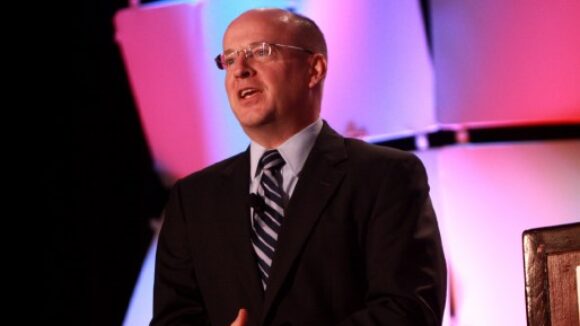
The House approved H.R.3441, the Save Local Business Act, a measure to amend the National Labor Relations Act and the Fair Labor Standards Act.
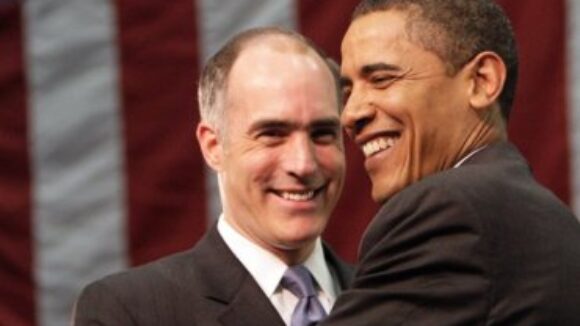
In this year’s elections, Bob Casey (D-Pa.) (pictured with former President Barack Obama) and a number of other Big Labor senators will have to answer for their votes to perpetuate federally imposed force unionism. CREDIT MEDIA.PENNLIVE.COM National Right to Work…
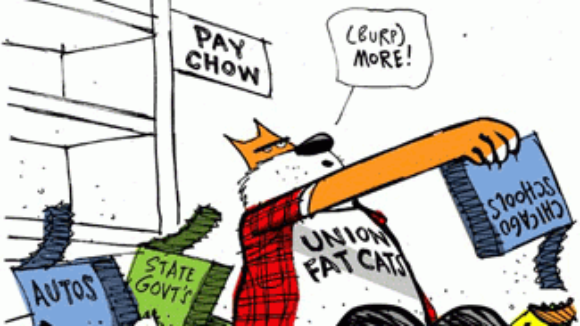
Matt Kibbe looks at why the "resolution" of the teacher's strike in Chicago is not in the best interests of the children and taxpayers of the state: The Chicago Teachers Union Strike may be resolved for now, but the events illustrate a serious problem facing the United States: union bosses are manipulating government leaders, using teachers and students as human shields in their fight to maintain power over the educational system. Their stranglehold on education has to end if our children are to have any hope of getting the education they need to compete in the world. [media-credit name=" " align="aligncenter" width="300"][/media-credit]Teacher pay got a lot of attention in coverage of the debate, but it was far from the only issue at play in the strike, which ended Wednesday under the promise of a resolution that appeased the union bullies. The primary disagreements were over who has the power to hire and fire teachers, and accountability for student performance. The union insisted that it should have the right to dictate who gets hired to fill jobs in the district. Primarily, it wanted to take hiring authority away from school principals by requiring that laid-off teachers be hired back. Union leaders also rejected the perfectly reasonable demand from the city of Chicago that standardized test scores play a role in evaluating teacher performance. A roofer is judged by how well his shingles keep out the rain. A CFO is judged by her company’s balance sheet. A journalist is judged by the accuracy and fairness of his story. Yet somehow union leaders think teachers shouldn’t be judged by the outcome of their work. Teachers’ unions exist to promote what’s best for teachers, not students. As Albert Shanker, the late president of the American Federation of Teachers, once reportedly put it, “When schoolchildren start paying union dues, that’s when I’ll start representing the interests of schoolchildren.” (Shanker’s supporters dispute that he said this, but the quotation’s staying power illustrates the accuracy with which it represents union motives.) Because they exist to protect the status quo, unions oppose the kind of meaningful education reform America needs. They oppose education tax credits, school vouchers, charter schools, merit pay, and virtually all attempts to impose real accountability. They instead support a system that sees the United States spending nearly two and a half times more per pupil today than in 1970. What have we received in return? Stagnant math and reading scores for 17-year-olds, and a decline in science scores.
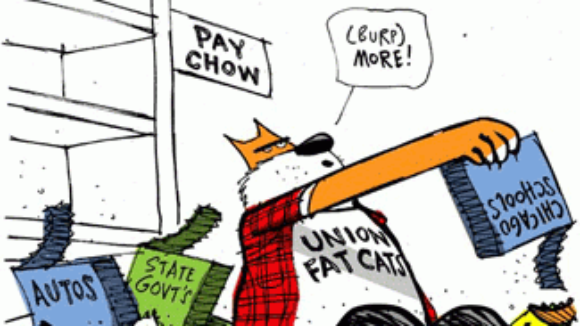
Matt Kibbe looks at why the "resolution" of the teacher's strike in Chicago is not in the best interests of the children and taxpayers of the state: The Chicago Teachers Union Strike may be resolved for now, but the events illustrate a serious problem facing the United States: union bosses are manipulating government leaders, using teachers and students as human shields in their fight to maintain power over the educational system. Their stranglehold on education has to end if our children are to have any hope of getting the education they need to compete in the world. [media-credit name=" " align="aligncenter" width="300"][/media-credit]Teacher pay got a lot of attention in coverage of the debate, but it was far from the only issue at play in the strike, which ended Wednesday under the promise of a resolution that appeased the union bullies. The primary disagreements were over who has the power to hire and fire teachers, and accountability for student performance. The union insisted that it should have the right to dictate who gets hired to fill jobs in the district. Primarily, it wanted to take hiring authority away from school principals by requiring that laid-off teachers be hired back. Union leaders also rejected the perfectly reasonable demand from the city of Chicago that standardized test scores play a role in evaluating teacher performance. A roofer is judged by how well his shingles keep out the rain. A CFO is judged by her company’s balance sheet. A journalist is judged by the accuracy and fairness of his story. Yet somehow union leaders think teachers shouldn’t be judged by the outcome of their work. Teachers’ unions exist to promote what’s best for teachers, not students. As Albert Shanker, the late president of the American Federation of Teachers, once reportedly put it, “When schoolchildren start paying union dues, that’s when I’ll start representing the interests of schoolchildren.” (Shanker’s supporters dispute that he said this, but the quotation’s staying power illustrates the accuracy with which it represents union motives.) Because they exist to protect the status quo, unions oppose the kind of meaningful education reform America needs. They oppose education tax credits, school vouchers, charter schools, merit pay, and virtually all attempts to impose real accountability. They instead support a system that sees the United States spending nearly two and a half times more per pupil today than in 1970. What have we received in return? Stagnant math and reading scores for 17-year-olds, and a decline in science scores.
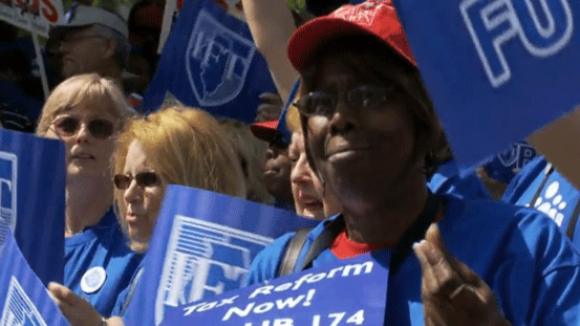
[media-credit name="EAG" align="alignright" width="300"][/media-credit]The Chicago Tribune reports that hard core socialists within the teacher's unions are blocking a deal to get teachers back in the classroom. It's amazing they have so much influence and power . . . or is it? Chicago teachers were anxious this morning as they walked the picket line for the seventh day, worried whether union officials will decide today to call off the strike that has kept 350,000 students out of the classroom. “I’m hoping the delegates come to their senses and know that our kids need us,” Mary Silva, a CPS social worker, said outside school headquarters. [...] But as in many labor organizations, Lewis is faced with uniting a membership that spans the political spectrum. In CTU, that ranges from high-ranking officials who have written for socialist websites to more traditional members simply concerned with working conditions. Some of those more radical factions inside and outside her labor organization are now attacking her and others in union leadership. Leaflets calling Lewis a “sellout” for concessions agreed to with CPS were distributed to union delegates at Sunday’s meeting. That phrase surfaced again among frustrated delegates as they left the meeting with few concrete details about the contract proposal and with serious concerns about what they were being asked to sign.